
Dante Alighieri, most likely baptized Durante di Alighiero degli Alighieri and widely known and often referred to in English mononymously as Dante was an Italian poet, writer, and philosopher. His Divine Comedy, originally called Comedìa and later christened Divina by Giovanni Boccaccio, is widely considered one of the most important poems of the Middle Ages and the greatest literary work in the Italian language.

Beatrice "Bice" di Folco Portinari was an Italian woman who has been commonly identified as the principal inspiration for Dante Alighieri's Vita Nuova, and is also identified with the Beatrice who acts as his guide in the last book of his narrative poem the Divine Comedy, Paradiso, and during the conclusion of the preceding Purgatorio. In the Comedy, Beatrice symbolises divine grace and theology.

Gianni Schicchi is a comic opera in one act by Giacomo Puccini to an Italian libretto by Giovacchino Forzano, composed in 1917–18. The libretto is based on an incident mentioned in Dante's Divine Comedy. The work is the third and final part of Puccini's Il trittico – three one-act operas with contrasting themes, originally written to be presented together. Although it continues to be performed with one or both of the other trittico operas, Gianni Schicchi is now more frequently staged either alone or with short operas by other composers. The aria "O mio babbino caro" is one of Puccini's best known, and one of the most popular arias in opera.

The Battle of Montaperti was fought on 4 September 1260 between Florence and Siena in Tuscany as part of the conflict between the Guelphs and Ghibellines. The Florentines were routed. It was the bloodiest battle fought in Medieval Italy, with more than 10,000 fatalities. An act of treachery during the battle is recorded by Dante Alighieri in the Inferno section of the Divine Comedy.

Riccardo Zandonai was an Italian composer and conductor.

The Divine Comedy has been a source of inspiration for artists, musicians, and authors since its appearance in the late 13th and early 14th centuries. Works are included here if they have been described by scholars as relating substantially in their structure or content to the Divine Comedy.

Signa is a comune (municipality) in the Metropolitan City of Florence in the Italian region Tuscany, located about 12 kilometres (7 mi) west of Florence.

Rolando Panerai was an Italian baritone, particularly associated with the Italian repertoire. He performed at La Scala in Milan, often alongside Maria Callas and Giuseppe Di Stefano. He was known for musical understanding, excellent diction and versatile acting in both drama and comic opera. Among his signature roles were Ford in Verdi's Falstaff and the title role of Puccini's Gianni Schicchi.

George John Warren Venables-Vernon, 5th Baron Vernon, was a British politician. He was one of the last members of parliament for Derbyshire and the first for South Derbyshire. Vernon had a lifetime enthusiasm for Italian literature, particularly Dante after visiting Italy as a child. Vernon county is named after him in Australia.
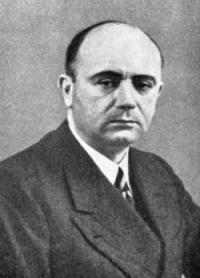
Enrico Cerulli was an Italian scholar of Somali and Ethiopian studies, a governor and a diplomat.
Ernesto Badini was an Italian opera singer that sang in the baritone range. He was trained at Milan Conservatory and made his debut as Matteo at Lodi's Teatro Gaffurio in 1896. Badini was a regular performer at Milan's La Scala and achieved his greatest success in the comic role of Puccini's Gianni Schicchi.

Giovacchino Forzano was an Italian playwright, librettist, stage and film director. A resourceful writer, he authored numerous popular plays and produced opera librettos for most of the major Italian composers of the early twentieth century, including the librettos for Giacomo Puccini's Suor Angelica and Gianni Schicchi.

Inferno is the first part of Italian writer Dante Alighieri's 14th-century narrative poem The Divine Comedy. It is followed by Purgatorio and Paradiso. The Inferno describes the journey of a fictionalised version of Dante himself through Hell, guided by the ancient Roman poet Virgil. In the poem, Hell is depicted as nine concentric circles of torment located within the Earth; it is the "realm [...] of those who have rejected spiritual values by yielding to bestial appetites or violence, or by perverting their human intellect to fraud or malice against their fellowmen". As an allegory, the Divine Comedy represents the journey of the soul toward God, with the Inferno describing the recognition and rejection of sin.
Jacopo Alighieri was an Italian poet, the son of Dante Alighieri, whom he followed in his exile. Jacopo's most famous work is his sixty-chapter Dottrinale. He is represented by his father in the Paradiso of the Divine Comedy as Saint James along with Saint Peter and Saint John the Evangelist, representing his brothers Pietro and Giovanni.
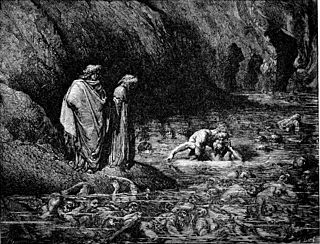
Ruggieri degli Ubaldini was an Italian archbishop.
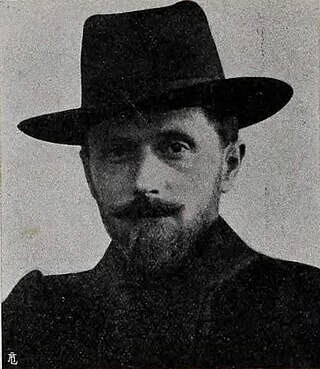
Lionello Balestrieri was an Italian painter and engraver, active in various styles mainly in Paris and Naples.

The Divine Comedy Illustrated by Botticelli is a manuscript of the Divine Comedy by Dante, illustrated by 92 full-page pictures by Sandro Botticelli that are considered masterpieces and amongst the best works of the Renaissance painter. The images are mostly not taken beyond silverpoint drawings, many worked over in ink, but four pages are fully coloured. The manuscript eventually disappeared and most of it was rediscovered in the late nineteenth century, having been detected in the collection of the Duke of Hamilton by Gustav Friedrich Waagen, with a few other pages being found in the Vatican Library. Botticelli had earlier produced drawings, now lost, to be turned into engravings for a printed edition, although only the first nineteen of the hundred cantos were illustrated.
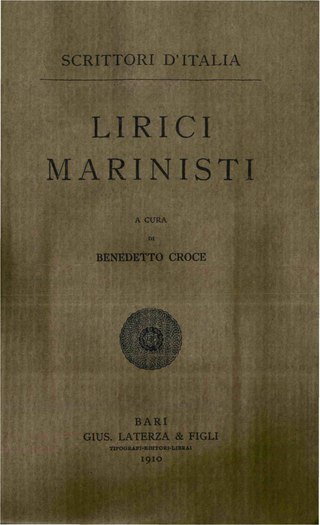
The Scrittori d'Italia was an Italian book collection, published by Giuseppe Laterza & figli from 1910 to 1987 in Bari. The series was born with the intent to define and explain a cultural canon of the new Italy, disassociating from a culture yet considered too much based on the classic of the humanism, and choosing to represent also the civil history of the newborn Italian State. The original work plan included 660 volumes, of which 287 were actually published for a total of 179 works.
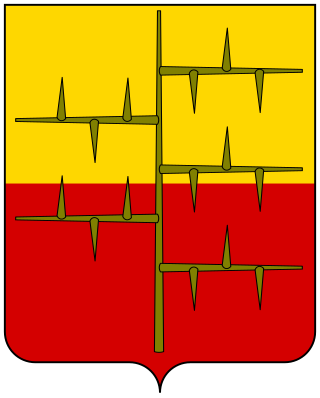
Corrado Malaspina was an Italian nobleman and landowner.

Leopoldo Metlicovitz was an Italian painter, illustrator and poster designer.
![Detail of Dante and Virgil by William-Adolphe Bouguereau (1850); Schicchi, with red hair, portrayed biting into Capocchio [it]'s neck William bouguereau, dante e virgilio, 1850, 04.JPG](http://upload.wikimedia.org/wikipedia/commons/thumb/1/1e/William_bouguereau%2C_dante_e_virgilio%2C_1850%2C_04.JPG/220px-William_bouguereau%2C_dante_e_virgilio%2C_1850%2C_04.JPG)

















